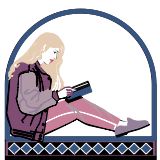Oral History Through the Ages
Oral history is older than written history. Homer’s early epics the Iliad and the Odyssey were transmitted orally long before they were written down. Here Sarah Rahman describes how oral history has progressed into the present. For centuries the important stories of marginalized peoples have been transmitted orally in the face of barriers based on illiteracy caused by lack of education, race, caste, gender, or sexuality. Current oral history projects, Rahman writes, are efforts “to listen, to include, and to understand.”
Landmark LGBTQI books
Five Books is a website that offers curated, scholarly recommendations for good books on all sorts of topics. Here Rosie Wilby, who has researched the psychology of love and relationships, recommends five books that showcase LGBTQI love. “LGBTQI stands for ‘lesbian, gay, bisexual, queer and intersex.’”
15 LGBTQ Reads for Mid and Late 2021
To supplement Rosie Wilby’s list above, high school teacher Aurora Lydia Dominguez introduces 15 more titles that have been recently published or are due to be published in the near future.
The Idiosyncratic School of Reading
About 45 years ago I completed the coursework though not the dissertation for a doctorate in English. There were many reasons for my decision to leave academia, but one of the most important ones was my dissatisfaction with the elitism and disdain for ordinary readers. Everyone in the department, both faculty and students, felt they, the educated, were the only ones who could read literature correctly. There was complete disdain for what the rest of the world considered “literature.”
I was therefore delighted to come across this article by Richard Hughes Gibson, an associate professor of English at Wheaton College. Using an essay by Virginia Woolf as a basis, Gibson describes what he calls the “Idiosyncratic School” of reading, “the company of writers and educators who celebrate the powers and particularities of lay readers.” For Woolf, Gibson writes, “reading should be a self-directed exercise, governed by our own tastes and filtered through our distinctive imaginations and life experiences.”
After so many years, I finally feel vindicated.
The Legacy of Trauma: How Mine is Hers
Lately I’ve come across several articles by novelists about how they have transformed their own trauma into fiction. Here Nicole Bokat describes how her medical experiences informed how she created Natalie Greene, the protagonist of her lates novel, The Happiness Thief:
eventually, writing about the happiness industry caused a reckoning in me. Digging into the perilous moments, figuring out what they meant, could be a way out of the heartbreak and fear that the pressure to be positive could never achieve. These experiences could be put to use as I created my character, Natalie, who’d lived through her own devastation.
What’s a Nice Guy Like Me Doing in a Homicidal Place Like This?
“Ruminations on what drives decent, ordinary folks to write about murder and mayhem.”
Writer John David Mann explains how he went from writing “nice, quiet nonfiction books about agreeable things” like leadership, motivation, and personal development to “putting [himself] into the shoes of a sociopath as he coolly dismembered his shrieking victim before tossing him off a boat into the jaws of a waiting tiger shark.”
How Falling in Love with an Indie Press Has Changed Me as a Reader
Laura Sackton describes how discovering a small indie press by falling in love with the books it publishes has made her a more adventurous reader: “This is what’s so exciting about getting to know an indie publisher. I’m more likely to read books I might not have otherwise picked up. I’m more likely to take risks on books outside my go-to genres.”
© 2021 by Mary Daniels Brown


